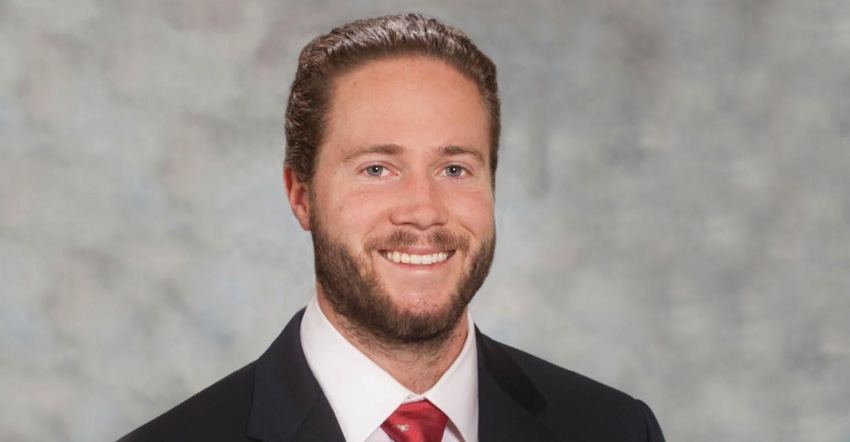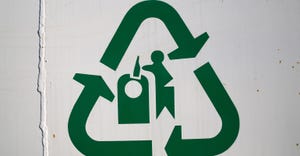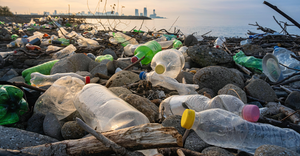February 24, 2020

Hi, everyone, welcome to Waste360 NothingWasted! Podcast on every episode, we invite the most interesting people in waste recycling and organics to sit down with us and chat candidly about their thoughts, their work, this unique industry and so much more. So, thanks for listening and enjoy this episode.
[INTRO MUSIC]
Liz: Hi, everyone, this is Liz Bothwell from Waste360 with Sean Jennings, CEO of Waste Pro. Hi, Sean. And thanks for being here today.
Sean: Good morning. Thanks for having me.
Liz: One of the best things about this great industry is it's the family business, grassroots start that so many companies have, and I know you're a third-generation waste guy and that's awesome. So, we'd love to hear a little bit more about your background and your journey to where you are now.
Sean: Sure. Well, I got my start industry back in 1990, which was the same year I was born and now. But really, I started working during summers in high school and college, just like my dad did with his father. And then after college, I began traveling around with one of our senior V.P. and really just working on various projects throughout our footprint.
So, after traveling our footprint with our senior vice president, I would work on various projects. Actually, there was one-point, kind of funny story. We were working in Indianola, Mississippi. And after we were, we were finished working on some of on some of the initiatives that we were working on, went to the mayor's office to go just check and see how things are going. He said “man, you know, I really appreciate it. Appreciate you guys and the things you're doing, actually I even saw you. You had a woman out there throwing trash”. And we look each other like, well, you know, it was just must have been Sean who refused to cut his hair. But I mean, like present a good boy. We do need more women out there.
Liz: And Sean, have you cut your hair since?
Sean: No, I haven't quite made to that point.
Liz: That's awesome.
Sean: So then, yeah, after traveling around, working on some different projects throughout our footprint, went down to Costa Rica to work for another hauler and spent about half my time as a helper and about half my time at a landfill.
And, you know, as a helper was it was a pretty awesome experience. And from what everybody told me here was kind of how it was 30, 40 years ago in the US with just really heavy organic crowds, little packaging mixed in the waste stream. I mean, like these routes did like two to four loads of 15 tons each day. And they were so they were heavy. But soon, I got to pick up trash for towns that have had never before received trash service. And even some areas where people told me I was a first gringo they ever saw in person. It shows the kind of surprise. I mean, we're not that rare. But at the landfill, it was really just general labor digging trenches, washing trucks before they went up, went back out on the highway and prepping.
And so I really enjoyed my time there, but I knew I had to get back to get to get back home, get back to Waste Pro and but looking back, I really wanted to understand what lesson was going to take from this time spent there.
And one thing that always stuck with me, you know, you hear the phrase people say, we're speaking in different language, even when in reality we're speaking the same language. So for me, right there I just I realized that communicating respect transcends any spoken language. And that was something that I wanted to try to keep in my mind as I was coming back home.
Liz: Oh wow, great lesson.
Sean: So then I came, came back to us and enter the division manager role at a purely subscription residential market of ours. And I was there for about a year. I had a lot of fun. I learned a lot of lessons. And from there traveled down to our Sarasota location in Florida and was just really fortunate to be part of an incredible division team and a region team that really helped mentor me as person and as a garbage man. And got to be a part of ah MRF Construction CNG and single stream conversion. We also had a had a very quick contract startup that also coincided with Hurricane Irma, which was very interesting.
And then after that, I really entered the role that I'm in now and I'm continuing my education of who we are as a company in our industry and going from there.
Liz: Well, that's fantastic. So, building a winning team is a challenge for any leader and your local team with the highest performing one at Waste Pro in consecutive years. Do you have any advice on building, retaining and motivating strong team?
Sean: Well, I am a believer in that you have to create the environment for the people you want before you have people that you need. And so really that's that was a focus that that we always had. And a lot of it begins with creating an environment that is that is safe.
Having a safe environment, because there is really the place that you have to start with, with showing your people that you care about them, is putting them in an environment where they're going to be able to go home at the end of the day.
So that's I think that's huge. And for us, you know, as far as creating that that that safety environment, in that environment where people have safety in mind, sometimes people need a little nudge to remind them why they want to be safe. You know, it might be something simple, like a picture of their family. It might be the community that that we create within the division, within the operation. That is a reminder “hey, you want to be safe because I won't be able to enjoy this”. Those are things that we try to do.
Liz: Oh, that's great. And then a big challenge these days is the driver shortage. And you've been credited with building a great recruitment and training program for your drivers. Could you tell me more about that?
Sean: Sure. Yeah. Similarly, it's kind of creating the environment that we need for our people that, you know, that's supportive. And, well, what we care about is are you good at your job? And it doesn't matter what you look like, what you think about determining if you're going to be good at your job or not.
So, I'm saying that we need to create an environment for all variations of people. A place where people will feel comfortable and in place where people all different choice people want to be. But some things that we have done to build up our workforce and to help with recruiting. We have a supervisor training program which, you know, the supervisor position is just so core and so important to building and sustaining our culture. We also have a partnership with the State Department of Corrections where we can actually begin hiring process while they're still incarcerated. That's been that's been helpful.
We have driver training centers which are both for new hires and for people who need retraining. And it's not like you can go to the training center and it's just a sure thing that you're going to make it on board. It's a pass fail. So, we take it really seriously. We have mentors for once you do get hired. And, you know, that's really important to make people stick to the community.
Of course, you know, we have our $10,000 and $5,000 bonuses for drivers and helpers if they can go three years without any actions, injuries, property damage, and have a clean truck and good customer service.
And one of one of our favorite programs is called the CO Heart Program. And when I got my CDO, I went to a school in Orlando. And our CDL instructor was just the most captivating, enthusiastic, personable person that maybe that I'd ever even met.
And so, at the end, you know what, we were we were talking with him and he was looking to do more with his knowledge and his enthusiasm. So, he came on with us. We didn't have a position yet. But over time, he really created a position for himself that he mentors and coaches and helps our helpers get their CDL.
It's an incredible program because people can come in with. With no license, no credentials or anything like that, just a willingness to try to better themselves. And Robert can help them get to that next point.
Liz: Oh, that's fantastic. He was a great find.
Sean: Yeah. Yeah.
Liz: So how have you brought a millennial perspective to your new role as the pumps and the company as a whole?
Sean: That's a good question. I figure that you're probably going to ask me something related to age. You know, I think that that we don't have the luxury of like the tech startup culture where we can have a free beer and work and you can bring your dog in the office because our work environments are a little different. But I think that ultimately people want. I mean, people have needs and for us, one big need that we can satisfy as it is, that need to be part of a social structure, to be part of a community, be part of a team and working towards one thing. So, I think that regardless of millennial or not, that's one thing that that we can provide for people that they'll need always.
But we do have a future leadership program. And we look out for graduates from colleges, drought, the Southeast or maybe they didn't graduate, but their education was in the garbage industry. And that's can be even better sometimes. And when they're in the program, we have we have scheduled meetings and different classes. And eventually they're given an opportunity to show what they can do.
And, so I think that that for us, we're just very open to people who, if they have a desire to better themselves, regardless of their age or anything like that, we want to provide people an opportunity to have a desire.
Liz: Oh, that's fantastic. What a great outlook. And Sean, you oversaw, like you mentioned, the building of that MRF in Florida. How was that experience and what do you think makes today's Smurfs ready for the future of the waste stream?
Sean: Well, I think that processors today react to the labor challenges and the material quality expectations. And we have time to adapt and to invest in the technology that we need to make the material clean and to react to the difficulties of finding sorters. So, I think that like we've been seeing over the last couple of years, we have to invest in what we need to do to have the material that's acceptable. And then we have to charge to process the materials so that the recycling process is sustainable. So, I think that, really, I know that some municipalities are considering whether or not they want to keep single stream, but because of labor challenges, I'm sure that will that will stick with single stream and the processing will just more reacts to handle it.
Liz: That makes sense now. Speaking of sort of their changing way stream, what have you seen since. Since you've been there in terms of how that stream is changing? Are you seeing more EA waste, more cardboard because of the retail boom? What are you saying?
Sean: I can't really speak on the e-waste, but definitely over the years, we've seen a lot more cardboard. And in Florida some places and maybe not just in Florida, but certain retirement communities may have more paper for magazines and newspapers that are read. So, we see that, but I don't know if I can really speak on those stream changes over time.
Liz: Mm hmm. Ok. Well, I think they're just going to continue to change. And like you said the MRF is kind of getting ready for it.
Sean: Yeah. I mean, there's really some impressive technology coming out.
Liz: So, speaking of technology, how do how do you view technology and how has it changed or improved your business?
Sean: Well, I think that in the waste industry, we can expect technology to just continue to assist the industry and also answer are some of our safety needs, make equipment that's safer or less physically intensive. I think that there will be more and more technology that will assist our wide range of systems from routing, communication, customer experience, sales, digital marketing.
But I mean, really, people who want to look for a technology that will totally turn it industry upside down, if there was some sort of technology that could allow us to handle our material in a way other than a landfill, that would that would turn this industry upside down. That would be interesting if we could find some technology that could make it financially feasible to remove the landfill as a factor.
Liz: Right. That's true. So, my husband is in a family business and he tries to keep business and families separate, but it's completely ingrained in his DNA and his dad's DNA. So, are you and your dad able to separate it at all?
Sean: The business is what both of us like to think about and talk about pretty much at all times. So, when we're not I think it's a conscious decision, like, okay, maybe give it a rest for a little bit because we talked about this all day.
But, you know, I mean, there's nothing I just can't imagine anything better than being able to work with your family. I have some of my greatest memories are just simply driving around with my dad when I was a little kid from division to division. And I don't really know what we were doing, but we're going around seeing trucks hanging out, go to places of there been before. And we try to encourage that with other people within ways drove. If they can give their kids an opportunity to be a part of this awesome industry, then go for it.
Liz: I love it. That's fantastic. And who knows who you're inspiring there? You never know.
Sean: Yeah.
Liz: So, what do you think is next for you in your role and also waste process as a whole?
Sean: Well, I think that that for us, we want to continue to search for people who share the same mindset as us, whether it's customer, employee or another hauler that that wants to join forces with us. So that's the biggest thing for us when we want to find people who also have a long-term mindset and they want to build a community and ultimately create a vessel to enjoy life.
Liz: That's great.
Sean: And, you know, I mean, especially now there's with. A lot of interests in our industry, there's a lot of people who look our industry as a means to invest in, flip it, get your money out. And I mean, that's just the polar opposite of what our mindset is.
Liz: Well, that's great. You're in it for the long haul.
Sean: Able to find another family company that that really shared the same long-term mindset with us there and in Pasco County, Florida… JD Parker, who literally started trash collection in their county 70 years ago. And their mindset is we want to create something that our family can be a part of. We can create opportunity for people that we care about and create a great reputation or community, be a part of it.
And so, I mean, that was just a perfect partnership between us and them.
Liz: Oh, it sounds like it. That's great. And it sounds like you're very focused on people and making people feel safe and comfortable and part of a community. How do you do that on a day to day basis?
Sean: I think it's difficult to do that on a day to day basis because the more meaningful conclusions that people may eventually come to can't be made that quickly. That's how it's got to be built over time. And you've got to build up trust with people. So, I think that's the biggest thing. I mean, technology is such a really popular topic. People always generate a lot of question about technology. But I think that sometimes people overlook that it's really going to be hard to push people out of this industry. That's not what we want as far as having technology push people out. So instead of looking for ways that happen, why don't we look for ways to really capture the potential of people? So that's that that's what we'll be doing more of as we go forward.
Liz: Great. And what advice would you give to professionals entering this industry and
Sean: Enjoy it. And you know that the industry is going to be around. So, you can you can enjoy the journey along the way and enjoy everything in between the ups and downs. I mean, it really can be a fulfilling industry.
Liz: That's true. And Waste Pro does a great deal for its local communities. What types of organizations are you guys working with nowadays?
Sean: Is that really the you know, the organizations that we want to be involved in it really depends what is relevant to that specific community. Typically, we're not going to be involved in something that's nationwide because that may not penetrate each community as well as something that's near and dear to that specific one.
I mean, like where I live in Sarasota, in Britain, you know, they're sort of break and they're their neighbors. There's really great organization that's just here. It's called Just for Girls. And we like to be involved in that because it was it was started here. And it works out on the premise that in certain, you know, certain communities where resources are limited, the first person that gets left out is the girl. So, it's pretty crazy when you think about that. That's half of the population that is not receiving the same amount of resources or assistance that that really could be used to help push the community forward.
Liz: Oh, that's great. That sounds like a good one. So, what do you what else do you think we should be paying attention to in the world of waste recycling and organic?
Sean: I would hope for policy changes that can give space for other technology to it to handle our resources. OK. Right now, just in the US, there is little room to make it work financially. But if there is policies in place that that could make it work, I think that we can see that happening eventually. Great social.
Liz: What keeps you busy outside of work?
Sean: I like to go to the beach. I like to be healthy or go spend time with friends and family. My girlfriend didn't want me to forget to say that I have a hobby of policing the laundry. Please. I don't I don't necessarily agree with that.
Liz: That's awesome. So, tell me, how can listeners hear more from you and from waste?
Sean: Me, personally, I don't I don't have much of a social presence. So, I know that I would just get in contact with us as a company, whether it's to Web site or Twitter or Facebook, whatever.
Liz: Ok. Sounds good. Well, we're definitely going to keep watching you grow and watch the company succeed. And we're very happy for you. We love to see our 40 under 40 winners thrive like you are. So, congrats on everything, Sean. And we look forward to talking with you soon. And thank you for your time today.
Sean: All right. Great. Thank you for your time.
Liz: OK. Bye.
You May Also Like


